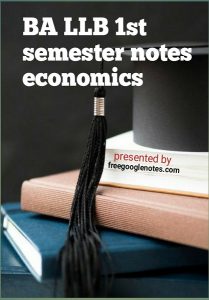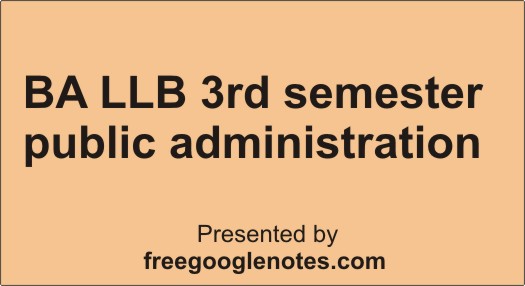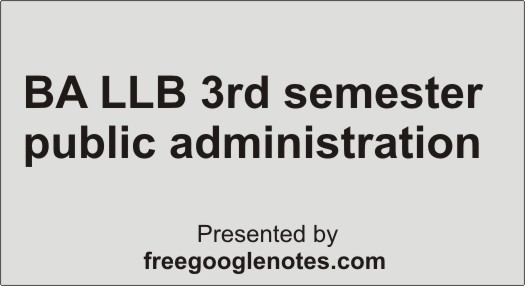Table of Contents
ba LLB 1st-semester economics notes pdf
In this post,
present upon you B.A. LL.B.first semester,(paper IV) Economics-I (code: BL-104) notes
Examine the difficulties that arise out of the fact that welfare economics is concerned with value judgements. or
State the distinction between Positive and Welfare Economics and examine the criteria of value judgements.
Define welfare. To what extent economic welfare can be regarded as the index of measure of total welfare? Illustrate the conflict between economic and total welfare? or
Economic welfare is always conceived to be a part of total welfare” Discuss. (BA LLB)
General Welfare refers to all economic and non-economic goods and services that provide utilities or satisfaction to individuals living in a community. In this sense, general welfare becomes a very wide, complicated and impracticable notion. Pigou, therefore, defines economic welfare as that part of general welfare which can “be brought directly or indirectly into relation with the measuring rod of money.” In the Pigovian sense, economic welfare implies the satisfaction or utility derived by an individual from the use of economic goods and services or those that can be exchanged for money.
But Dr. Graaf does not agree with Pigou’s concept of economic welfare for two reasons. First, money as a measure of welfare is neither accurate nor satisfactory because the value of money changes with variations in the price level. Second, economic welfare does not depend upon exchangeable goods and services because it is not possible to separate economic factors from non-economic factors, so far as an individuaľs state of mind is concerned. Robertson while accepting Pigou’s distinction between general and economic welfare, prefers to use the world care for economic welfare, Boulding, on the other hand, defines economic welfare in terms of the Opportunity cost of exchangeable goods and services. He writes, What welfare economics really says is that there is a certain norm of exchange opportunities, divergences from which have to be especially justified. This norm is essential that everyone should be able to exchange anything
|
for anything else in any quantity at a ratio equal to the alternative costs or more generally, the rates of real transformation of the exchangeable.” According to Prof. Pigou, an individual’s welfare resides in his state of mind or consciousness which is made up of his satisfactions or utilities. But modern economists explain it in terms of a given scale of preferences. An individual’s welfare is said to have increased when he is better off: when he himself believes that his welfare has increased as a hypothesis. But it is not possible to ask every individual whether his welfare has increased or not.  Economic welfare implies the welfare of a group or society comprising all individuals. In a way, it is the summation of individual welfares. But unlike an individual, a society has no mind or consciousness. In a society, every person thinks and acts differently from others. Therefore, no social choice-expansion index can reflect social welfare. Social welfare thus implies the aggregation of the satisfaction or utilities of all individuals in a society. There are mainly two concepts for measuring welfare. The first relates to a Pareto improvement whereby social welfare increases when society as a whole is better off without making any individual worse off. This proposition also includes the case that when one or more persons are better off, some persons may be neither better off nor worse off. lt is, thus, free from making interpersonal comparisons. Hicks, Kaldor and Seitovsky have explained social welfare in the Paretian sense in terms of “the compensation principle.” In the second place, social welfare is increased, when the distribution of. welfare is better in some sense. It makes some persons in society better off than others so that the distribution of welfare is more equitable. This is known as distributional improvement and relates to the Bergson social welfare function. Welfare is an ethical term. So all welfare propositions are also ethical and involve value judgements Such terms as satisfaction, utility are also ethical in nature since they are emotive. Similarly, the use of a highly emotive word as ‘social’, ‘community’ or ‘national in place of economic’ is ethical. Since welfare economics is concerned with policy measures, it involves ethical terminology, such as the increase of ‘social welfare’ or ‘social advantage’ or ‘social benefit’. Thus welfare economics and ethics cannot be separated. They are inseparable, according to little, “because the welfare terminology is a value terminology.” Since welfare propositions involve value judgements, the question arises of whether economists should make value judgements in economics.
The majority of economists agreeing with Robbins switched over to the Paretian ordinal method in order to avoid interpersonal comparisons of utility. Kaldor, Hicks and Seitovsky formulated the compensation principle’ free from value judgements. Accordingly, economists can make policy recommendations on the basis of efficiency considerations. The objective test of economic efficiency is that the gainers from a change can more than compensate the losers. But this test of increased efficiency implies a value judgement because the gainers from a change are able to compensate the losers. The very idea of compensation involves value prescriptions. So even the formulators of the ‘New Welfare Economics have not been successful in building value-free welfare economics. Even the Paretian general optimum theory is not value-free. It states that an optimum position is one from which it is not possible to make everyone better off without making at least one person worse off, even by re-allocation of resources. This welfare proposition contains certain value judgements. The Paretian optimum is related to the welfare of the individual. In order to attain the optimum position every individual act as the best judge of his welfare. If any re-allocation of resource makes at least one person better off without making others worse-off, then the welfare of the society is said to have increased. These are all value judgements which Pareto could not avoid despite the fact that he used the method of ordinal measurement of utility. The obvious conclusion emerges from the above discussion that welfare economics and ethics are inseparable and interpersonal comparisons or value judgements are inseparable from welfare economics. All democratic countries have the ideal of a welfare state and the various legislative measures like free education, heavy excise duty on wine, compulsory national insurance, etc. are all value judgements. The economist cannot De expected to be an arm-chair academician. He can comment and also make policy recommendations on efficiency, distribution and equity grounds. All such recommendations involve value judgements but they must conform to public opinion. Positive Economics and Welfare Economics
Positive economics is concerned with ‘what is. It has generalisations, principles, theory or laws which trace out a causal relationship between
cause and effect. As a “pure’ or positive science, economics seeks to explain what actually happens and not what ought to happen. Welfare economics, on the other hand, is a normative study. It also deals with the causal relationship, between cause and effect but in addition to deriving conclusions from this relationship, it seeks to evaluate various results and to distinguish between them from a normative point of view. In other words, welfare economics is concerned with policy, i.e. with judgement and prescription.
Relation between Positive and Welfare Economics
To quote Senior, “The business of a political economist is neither to recommend nor to dissuade but to state general principles which it is fatal to neglect but neither advisable nor perhaps practicable to use as the sole or even the principal guide in the conduct of affairs.” Robbins finds a “logical gulf” between the positive and welfare fields of enquiry as they are “not on the same plane of discourse”. Since “economics deals with ascertainable facts” and welfare with valuations and obligations, he finds no reason for “not keeping them separate, or failing to recognise their essential difference.” Robbins concludes. All that is contended is that there is no logical connection between the two types of generalisations and that there is nothing to be gained by invoking the sanctions of one to reinforce the conclusions of the other.”This view that positive economics has nothing to do with welfare economics is divorced from the stern realities of life. The science of economics cannot be separated from the normative aspect. Economics as a science is concerned with human welfare. As pointed out by Pigou, Marshall believed that “economic science is chiefly valuable neither as an intellectual gymnastic nor, even as a means of winning truth for its own sake, but as a handmaid of ethics and a servant of practice.” On these considerations, Pigou regarded economics as not only light-bearing but also fruit-bearing’. Professor Boulding makes these observations with regard to the relationship between positive economics and welfare economics. “Some economists have endeavoured to restrict the boundaries of the science to the investigation of those quantities which are numerically measurable. Well-being under such a restriction would not be part of economics at all. Lionel Robbins….seems to deprive economics of the right to study welfare, for welfare is an ‘end’ in itself. Nevertheless, economists have always been interested in problems of wealth and welfare.”
|
|
|
|
|








